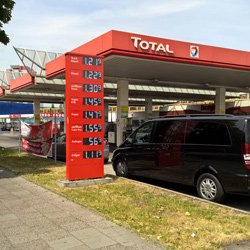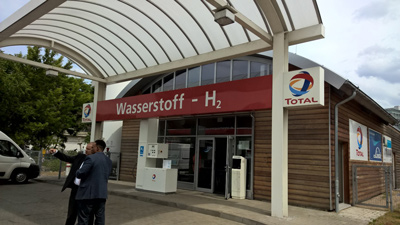 The NACS Insight Convenience Summit – Europe kicked off this week in Berlin, bringing together convenience and fuel retailing industry professionals from around the world to discuss new ideas and gain new commercial connections. Here, NACS Vice President of Member Services, Michael Davis, shares some of his insights from the first two days of the Summit, which will move on to London tomorrow.
The NACS Insight Convenience Summit – Europe kicked off this week in Berlin, bringing together convenience and fuel retailing industry professionals from around the world to discuss new ideas and gain new commercial connections. Here, NACS Vice President of Member Services, Michael Davis, shares some of his insights from the first two days of the Summit, which will move on to London tomorrow.
BERLIN – One of the reasons we came to Berlin on the first leg of the NACS Insight Convenience Summit - Europe (CSE) is because of its role as the home of retail “hard discounting” (also known as deep discount or extreme value stores). German firms Aldi and Lidl lead the pack and have become larger than European retail stalwarts Tesco and Carrefour.
 Aldi currently operates stores in the United States and Lidl likely will soon as well. So what do the trans-Atlantic moves of these retailers mean for convenience stores? Although Aldi has been in the United States for 40 years now, they haven’t had nearly the impact that they have in Europe. Perhaps it’s due to the tremendous U.S. growth of dollar stores -- there are currently more than 25,000 Dollar Tree, Dollar General and Family Dollar stores -- along with competitor hard discount grocers like Save A Lot, or the behemoth Walmart. No matter what the reasons, Aldi hasn’t been a “world-beater” stateside. Lidl will also find the U.S. market to be different from Europe, the U.K. and Australia, where Aldi and Lidl have sets their sights as well.
Aldi currently operates stores in the United States and Lidl likely will soon as well. So what do the trans-Atlantic moves of these retailers mean for convenience stores? Although Aldi has been in the United States for 40 years now, they haven’t had nearly the impact that they have in Europe. Perhaps it’s due to the tremendous U.S. growth of dollar stores -- there are currently more than 25,000 Dollar Tree, Dollar General and Family Dollar stores -- along with competitor hard discount grocers like Save A Lot, or the behemoth Walmart. No matter what the reasons, Aldi hasn’t been a “world-beater” stateside. Lidl will also find the U.S. market to be different from Europe, the U.K. and Australia, where Aldi and Lidl have sets their sights as well.
The convenience industry is in a different business: the immediate consumption (or more specifically, the immediate gratification) business. More than 60% of what convenience retailers sell (excluding alcohol) is consumed within 10 minutes of purchase and 83% (again, excluding alcohol) is consumed within 60 minutes. Like supermarkets, however, purchases made at hard discounters are for delayed consumption.
 NACS Insight Convenience Summit - Europe attendees had the opportunity to visit both Aldi and Lidl stores as part of the Retail Study Tours portion of the Summit. A few insights and “cool things” from those visits included:
NACS Insight Convenience Summit - Europe attendees had the opportunity to visit both Aldi and Lidl stores as part of the Retail Study Tours portion of the Summit. A few insights and “cool things” from those visits included:
- The Clean Energy Partnership is one of the most important international projects to test hydrogen as a fuel. It revolves around the development of technical standards – from production and swift, safe fuelling to the operation of hydrogen-powered vehicles. Integrated energy company Total has been part of this partnership and has six sites in Germany that sell a number of alternative fuel products including hydrogen. CSE attendees visited one of these sites in Berlin and learned about the evolution of hydrogen fueling first-hand from Total executive Carsten Retzke. Gaining an increased understanding of the future of motor fuels is one of the reasons we came to Berlin on the first leg of the Summit.
- More channel blurring! Berlin bakeries are in essence delis that offer great sandwiches, pizzas, pretzels and pastries. They also sell hot and cold beverages, snacks and more. Products are displayed beautifully and often taste better than they look. Bakeries have become a big part of the blurred “convenient” channel in Berlin.
NACS Insight Convenience Summit – Europe moves to London tomorrow, for two full days of general sessions and day of Retail Study Tours, as well as Thursday’s presentation of the International Convenience Retail Awards.